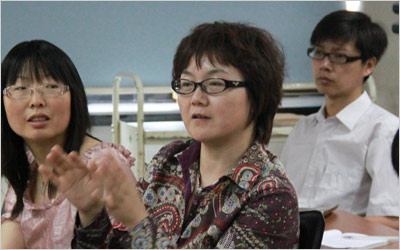
On May 25th 2010, Professor Richard Cornell, visited the Open University of China and gave an academic speech entitled "eLearning's Many Faces, Issues, and Potential" in the lecture hall of the library at the OUC.
Professor Richard Cornell is teaching at the University of Central Florida. He is the President of the International Council for Educational Media,
which is an organization under UNESCO. Professor Cornell has delivered hundreds of Technical Reports and academic papers, and published a number of multimedia productions. He has also worked as part-time academic advisor or leader in the Florida Audiovisual Association, Florida Association for Media in Education, Southeastern Regional Media Leadership Council, Association for Educational Communications and Technology (AECT), International Council for Educational Media (ICEM), Computer Pals Across the World (CPAW), International Society for Performance and Instruction, and other organizations. He has been honored with Distinguished Service Award by the Association for Educational Communications and Technology (AECT), International Contributions Award by AECT, and ICEM Honorary Member, just to mention a few.


In his presentation, he firstly gave an overall introduction about the situation of e-learning around the world—the current trends, new resources available, and the forecast for the year 2026. He then moved onto the eight scenarios we might face with the development of the internet and other advanced technologies in the future, including the prosperity of a global and low-cost network, the possibility of one language displacing others in the world, problems brought about by autonomous technology, transparency and people's lives, the advantages and disadvantages of virtual reality, the internet and the world, Luddites and Refuseniks' reacting to technology, and the priority for future investments in communication technology. He not only presented the eight scenarios, but also people's response to them as well, either from survey data or from educators such as himself, which showed us the two sides of the coin and provoked the audience to have further thoughts afterwards.

After the presentation, Professor Richard Cornell answered questions from the audience on technological abuse and the balance of fare-use of resources and the protection of copyright, and gave examples on technological applications in America.

At the end of the activities, he extended his gratitude for the opportunity to speak in the OUC and expressed his expectation for teachers of the OUC to make the best of modern technology, sparing no pains in better fulfilling the role to transmit wisdom, impart knowledge and resolve doubts.
